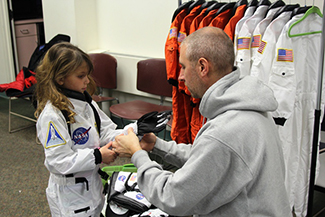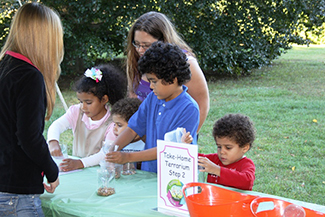The Harvard Family Research Project separated from the Harvard Graduate School of Education to become the Global Family Research Project as of January 1, 2017. It is no longer affiliated with Harvard University.
August 30, 2016
How the National Science Foundation Supports Family-Oriented STEM Learning
Joan Walker
Most people erroneously think of the National Science Foundation (NSF) as an “unassailable fortress,” but in reality NSF offers a variety of funding streams that can support families’ engagement in children’s STEM learning. Our mission at NSF, as it relates to education, is to advance the field of evidence-based learning and teaching practices in STEM. We prioritize STEM learning to build capacity in preparing the next generation of STEM professionals and to attract more Americans to STEM careers.
Broadening the View on NSF
We would like the family engagement and informal STEM learning communities to know that their work is a priority for the foundation and that we have a range of programs and funding opportunities that can advance the field. We are looking for projects that prioritize and authentically treat families as equal partners, wherein families are treated as legitimate stakeholders with knowledge and values that contribute to practical solutions to their children’s learning needs. Additionally, in response to increased cultural and ethnic diversity in the United States, we are committed to broadening participation in STEM learning by expanding efforts to fund programs serving underrepresented groups and diverse institutions throughout the country. We also believe that even projects at the earliest stages of development, such as exploratory projects, contribute great value, and can serve as a foundation for more research. Therefore, our programs deliberately support projects at different stages of development. Ultimately, our message to educators and researchers is that there is opportunity here to be accessed, and our goal is to distribute federal dollars equitably!
Funding Opportunities
At NSF, we offer several funding streams that support the creation of pathways for families and students to engage in anywhere, anytime STEM learning. Below are our main funding programs.
| Funding Stream | Description |
|
Advancing Informal STEM Learning (AISL) |
Builds on educational research and practice, and seeks to increase interest in, engagement with, and understanding of STEM by individuals of all ages and backgrounds through self-directed STEM learning experiences. |
|
Discovery Research PreK–12 (DRK-12) |
Seeks to enable significant advances in K–12 student and teacher learning of the STEM disciplines, through research and development of innovative resources, models, and technologies for use by students, teachers, administrators, and policymakers. |
|
Innovative Technology Experiences for Students and Teachers (ITEST) |
Seeks to engage students and teachers in the creative use of information technologies within the context of STEM learning experiences in school and other learning settings. |
|
Math and Science Partnership (MSP) |
Invites creative and innovative proposals that address emerging challenges in the learning and teaching of STEM and computing. |
|
STEM + Computing Partnerships (STEM+C) |
Provides funding in critical research areas that are essential, broad, and enduring. |
Here are some exciting examples of how these funding streams support family engagement in STEM.
- NURTURES: Networking Urban Resources With Teachers and University to enRich Early Childhood Science received $10M to support a community partnership between the University of Toledo (education, engineering, and natural sciences disciplines), Toledo Public Schools, local daycare centers, informal science centers, and other local resources. Together, they work to create a complementary, integrated system of science education for preschool through third grade in the Toledo area.
- RISE: Readiness Through Integrative Science and Engineering, out of Tufts University, received $2.1M to develop culturally relevant preschool curriculum and home-school partnerships to support young dual language learners’ school success. Through a partnership with Head Start, children and families bring their home and community experiences into the classroom, and also enhance their science and technological literacies.


A highlight of the NURTURES program is the hosting of free and experiential SCI-Fun Community events at partner locations such as the Toledo Botanical Garden, University of Toledo Ritter Planetarium, and the Toledo Zoo.
Tips for Educators Wishing to Pursue NSF Funding
- Don’t be shy about contacting NSF! We serve the public interest and YOU are the public.
- Know that we are looking for newcomers and new projects with geographic diversity.
- Reach out to program officers for support―that’s our job!
- Become a project reviewer to better understand how proposals are treated once received.
- Consult with NSF’s research centers, such as the STEM Learning and Research Center (STELAR) and the Center for the Advancement of Informal Science Education (CAISE), to access technical support to projects and opportunities for dissemination.
I’m hopeful that more educators in both formal and informal learning spaces will become more aware of NSF’s mission to promote STEM learning for all Americans and the foundation’s focus on initiatives that incorporate authentic partnerships with families.
Related Resources
To learn more about the variety of projects currently funded by NSF, we invite you to watch project videos from NSF’s 2016 STEM for All video showcase.
Joan Walker is a program director for the National Science Foundation’s Division of Research on Learning in Formal and Informal Settings. She is an expert on theories of learning, motivation, and assessment, and she is particularly interested in the interplay between the cognitive and social-emotional aspects of learning.

